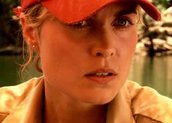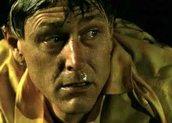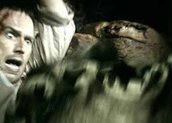


Rogue (2007)
Synopsis
US travel writer Pete McKell (Michael Vartan) arrives in the Northern Territory and joins tour operator Kate (Radha Mitchell) and a group of tourists on a riverboat daytrip through Kakadu National Park. As they watch a saltwater croc being fed from another boat Kate reassures everyone they’re not in danger. Two hoons turn up in a small outboard motorboat and make a lot of noise – one of them, Neil (Sam Worthington), has been romantically rebuffed by Kate – before they head off and the tourists continue up river.
At the end of the day, the party is about to turn back when they see a flare and go to investigate. At the end of the deep Kingston Gorge they emerge into swampland and discover an upturned metal boat with no sign of the occupants. Suddenly the tour boat is rammed from beneath by a huge but unseen crocodile. The hull is punctured but they manage to get the boat as far as a small island. Their only radio is waterlogged and they worry that the river is tidal and by nightfall will have covered the island. They need to get onto the riverbank but the crocodile is in the water. One of the party is killed by the crocodile. Neil and his mate turn up in their boat but an escape attempt goes wrong as people panic.
As the tide rises the crocodile picks off members of the party. Pete finds himself in the creature’s lair, a cave where it has dragged one of its victims, who is wounded but still alive. In order for both of them to survive, Pete will need to overcome his fear of nature and dispatch the creature.
Curator’s notes
Rogue is a gripping, cleverly structured and extremely well-crafted ‘creature feature’, loosely inspired by the classic films Jaws (1975) and Alien (1979) – a debt openly acknowledged by its writer-director-producer, Greg McLean. The film’s novel aspects are its choice of rogue (or giant) crocodile as an agent of terror, and its remote Northern Territory setting, captured via Will Gibson’s stunning cinematography. McLean was inspired by a real-life story of a rogue crocodile called Sweetheart, who terrorised fishermen in the late 1970s, attacking 18 boats, often by slamming into them from below and in one case biting off an outboard motor.
The film draws from classic story elements to achieve a universal significance. Rogue takes us on the hero’s journey common to many world myths as outlined by Joseph Campbell (a popular influence on contemporary filmmakers). The river journey is a literal representation of a protagonist’s metaphysical journey, loosely echoing classics like Aguirre: Wrath of God (1972) and Apocalypse Now (1979). This river trip represents the journey of Pete McKell, a pampered travel writer who expects comfortable hotels and other luxuries and is reluctant to be on a wild river trip at all. His diffidence fits with Campbell’s notion of ‘the refusal of the call’, in which heroes often express reluctance to embark on their adventure.
The various plans hatched to escape from the island and defeat the crocodile represent Campbell’s ‘road of trials’, a series of tests and ordeals, some of which the hero (and the hero’s associates) may fail before having the chance to transform themselves in a final battle. In the hero’s journey, muses and mentors are often key figures who teach, equip and persuade the hero to complete the task they are set. In Rogue this role is played by Neil, whose selfless leadership, despite his immature earlier behaviour, provides the inspiration and example that the prevaricating Pete needs.
That the climactic struggle should occur in a cave is significant. This represents Campbell’s concept of the ‘belly of the beast’, a point where the hero is deep inside the enemy’s lair (Christopher Vogler, a Campbell populariser influential in Hollywood, even calls this stage of the journey ‘the inner cave’). When Pete finally fights the creature, he becomes a modern-day Saint George attempting to slay the dragon. Having conquered his own demons, he emerges from the cave transformed.
Given its strengths, Rogue performed modestly at the local box office on its release in 2007. McLean may have put his finger on one of the reasons when he described it in the supporting documentary on the DVD as 'a very old-fashioned horror film’. McLean had managed to raise much of the financial backing for the film from Bob Weinstein’s Dimension Pictures following his commercial success with the gory horror film Wolf Creek (2005), about a backpacker killer in the outback. He’d written the script for Rogue before making Wolf Creek but several earlier attempts at financing had fallen through. When Dimension, which backed Wolf Creek, asked McLean what he wanted to follow his success with, he presented them with the Rogue script and they agreed to support the film’s production.
The young horror audience that liked the extremely violent Wolf Creek (2005) may have been underwhelmed by the lack of explicit gore in Rogue. The film had the misfortune to come out at a time when horror audiences were gravitating to so-called ‘torture porn’ films, including Wolf Creek and the Saw (2004–10) and Hostel (2005–11) films, a new wave of horror pictures that raised the bar on the depiction of suffering and bloodshed. The audiences that turned Jaws (1975) and Alien (1979) into hits were mainstream filmgoers, not hardcore horror audiences. But mainstream viewers may have been turned off by perceptions that, as McLean’s follow-up to Wolf Creek (2005), the film was another gore exercise with a crocodile in place of a serial killer.
The film may not have been helped by its one major weakness, the casting of Vartan, a US actor best known for the television series Alias (2001–06). As Pete, the actor is consistently outshone by the strong local supporting cast including Worthington, Radha Mitchell, Mia Wasikowska, John Jarratt, Celia Ireland, Stephen Curry, Heather Mitchell and Geoff Morrell. The script could have developed the character of Pete further, as he often seems to fade into the background. In an interview with The Age in October 2008, McLean acknowledged the script could have used more work, saying 'I could actually have been more open to developing it’. But none of this is to detract from the film’s many strengths.
Rogue was released in Australian cinemas on 8 November 2007. It won the 2007 AFI Award for Best Visual Effects (Andrew Hellen, Dave Morley and Jason Bath).
- Overview
- Curator’s notes
- Video 3 clips
- Principal credits
- Find a copy
- Make a comment
- Map
- Add your review



